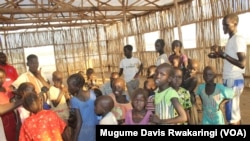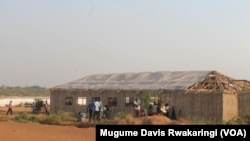For hundreds of thousands of South Sudanese, this Christmas will be spent in camps for internally displaced persons (IDPs) or refugee camps in neighboring countries.
U.N. House in Juba was turned into a camp for IDPs months ago. In the camp, a 14-square-meter structure has been covered with a plastic sheet and turned into a church. Days before Christmas, the makeshift place of worship was bustling as the choir rehearsed for mass to celebrate the birth of Christ.
One of the church leaders, William Deng Biar, said he believes Christmas presents an opportunity for all South Sudanese to unite.
"We want to tell people that Jesus will be born among us, that he will be born in our hearts and we want to live in peace," Deng said.
"We want to receive Jesus with love, we want to receive Jesus with hope, as well as peace in our country. That is what we want to give to our people in South Sudan.”
Not far from the makeshift church, 15-year-old Nya Lei Matin remembered what Christmas was like before South Sudan plunged into violence just over a year ago.
"In 2012 Christmas, we ate meat, we ate chicken, and we ate different kinds of foods because we were very many at home, unlike 2013," she said in her native Nuer tongue.
Matin was living in Juba with her father and sister and attending school when fighting broke out in the capital on December 15 last year. Her mother and two brothers were in Bentiu, the capital of Unity state. Bentiu has been the scene of repeated battles between government and opposition forces. At the beginning of the conflict, a U.N. official said the town had been wiped off the map.
For Matin, this will be the second Christmas in a row that she and her family will celebrate apart.
She says she not only misses her mother and brothers, but also misses rushing home after Christmas mass to help prepare a feast for the whole family.
Chudier Gai Chuol fled to U.N. House for his life when fighting broke out in Juba last December. He left his wife and children at home. His family is now living in Ethiopia; he is in this camp for IDPs.
“I am feeling pain, but because we are in war in South Sudan, what can I do? I want to bring them here but I don’t have the salary to bring them here. They will celebrate there and I will celebrate here. It is very painful to me but what can I do?” he said.
Remembering Christmas past
Deng Diang Chuol also ran to the U.N. House base with his wife and two children on December 19th last year – four days after fighting erupted. He recalled how the family celebrated Christmas before violence engulfed parts of South Sudan.
“We used to go to church, and after Christmas, we went to visit family," he said.
"We had different kind of foods:sometimes you can go and eat meat, sometimes you can eat chicken, sometimes you can eat pepper food, or you can eat our local food called Wal Wal,” he recalled.
Chuol never imagined he would spend even one Christmas in the camp, let alone two.
“We were hoping that if the international community intervened to bring peace, that we may go outside," he said.
International help
The international community has intervened in South Sudan: the regional bloc IGAD has been brokering peace talks since January, the African Union has appointed a team to investigate human rights abuses during the conflict, a international conference was held in Norway in May to raise funds for the much-needed humanitarian effort in South Sudan, and the United Nations has increased the number of international peacekeepers in the country.
Chuol says that even though he is one of nearly two million South Sudanese who have been displaced by the fighting, he is lucky because his family is still intact. They will be celebrating Christmas together at the U.N. House camp for IDPs. And like many others at the camp, they will be wishing and praying for peace.








